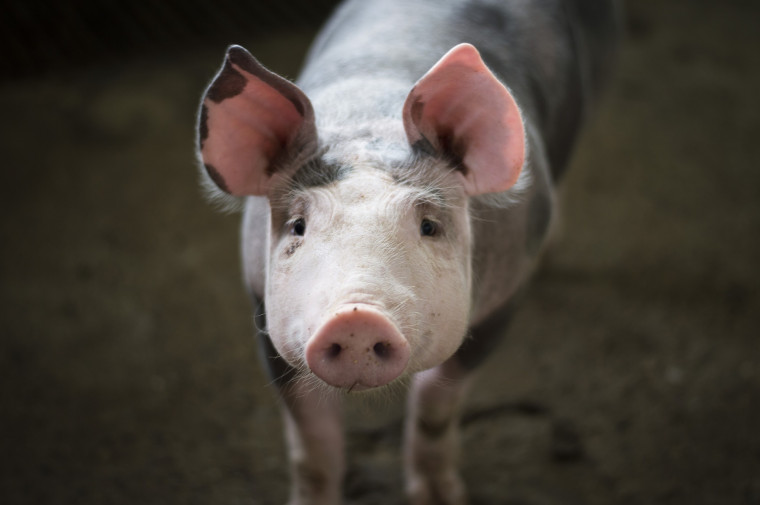Accountability Matters: The USDA’s 18-Year Failure to Regulate Sick and Injured Pigs Must End
Open gallery

By Professor Delcianna Winders
As COVID-19 outbreaks at slaughterhouses and their impact on the meat supply capture headlines, there’s another slaughterhouse disease link we also need to attend to: non-ambulatory, or downed, livestock. It’s a link that the Center for Animal Law Studies (CALS) is committed to addressing through litigation filed earlier this year by the Animal Law Litigation Clinic (ALLC) against the U.S. Department of Agriculture (USDA) on behalf of a coalition of animal protection organizations, including Farm Sanctuary, Animal Legal Defense Fund, Animal Outlook, Animal Welfare Institute, Compassion in World Farming, Farm Forward, and Mercy For Animals (Farm Sanctuary v. Perdue).
Every year, well over half a million pigs arrive at American slaughterhouses too sick or injured to walk. The USDA allows these pigs to go into the food supply, despite voluminous evidence linking the practice with increased risks of potentially fatal and drug-resistant human diseases as well as horrifying animal suffering.
The USDA’s 18-Year Failure to Investigate, Report on, and Regulate Downed Animals
Eighteen years ago today—on May 13, 2002—President George W. Bush signed into law a mandate that the USDA investigate and report to Congress on the issue of downed livestock, and, based on that report, regulate those animals as needed.
When pressed three months ago by the Washington Post, when it broke the news about our lawsuit, the USDA claimed that it had completed the report—but that it was precluded from releasing a copy (this despite the strong public interest in the information and no indication from Congress that it expected the report to be kept confidential).
It now seems clear that the USDA was lying: According to the USDA’s response last month to our Freedom of Information Act request seeking any reports created pursuant to the 2002 mandate, a “comprehensive search” found “no responsive records.”
That’s right: for nearly two decades, the USDA has thumbed its nose at legal mandates, imperiling animal welfare and human lives.
What the USDA’s Failure Means for Animal Welfare and Public Health
Unable to walk, downed pigs are often violently forced to their deaths, including through beating, punching, kicking, electroshocking, and dragging. Slaughterhouses also often hold these animals for long periods without veterinary care, painkillers, or food. In part because they are often held in pens for prolonged periods, unable to rise from feces-ridden floors, these animals are significantly more likely to harbor and transmit a host of potentially fatal and drug-resistant diseases, including Salmonella, Campylobacter, and Yersinia. A pork-industry funded study also found that more than half of all downed pigs were infected with swine flu subtype H1N1. According to the Centers for Disease Control and Prevention, the 2009 H1N1 pandemic sickened 60.8 million Americans and killed 12,469. More detail about the serious human health risks posed by downed pigs is provided in our brief at pages 6-10.
All of these risks are only compounded by the USDA’s recent moves to largely deregulate slaughter, including by revoking longstanding limits on how fast animals can be killed. The ALLC is challenging those moves in a separate lawsuit against the USDA.
When a law directs an agency to do something, it shouldn’t get away with just disregarding that mandate—especially when human lives and animal welfare are at stake.
Farm Sanctuary v. Perdue
The seeds for our pending lawsuit against the USDA were planted more than a decade ago when, as the Director of Legal Campaigns for Farm Sanctuary, I worked with my now-colleague Professor Kathy Hessler’s Animal Law Clinic at CALS to file a petition with the USDA asking that it do its job and protect animals and the public by banning the slaughter of downed livestock. By that time, the USDA had already defied the mandates for years and been admonished by Congress for doing so.
Still, the agency had done nothing.
After the USDA denied that petition, Farm Sanctuary, joined by the co-plaintiffs in our lawsuit, submitted a new petition in 2014, including thousands of pages of evidence documenting the serious human health and animal welfare implications of allowing downed pigs into the food supply. The immense suffering of these animals is discussed in our brief at pages 5-6, for those who wish to learn more.
This past fall, the agency denied that petition, after sitting on it for more than five years.
That’s why earlier this year the ALLC sued the USDA to challenge its abdication. One of the more disheartening lessons that I teach my students is that often change takes a very long time. But we have to keep fighting to help the animals.
Having already defied President Bush and Congress for almost two decades, instead of answering the lawsuit or, better yet, finally completing the required report and regulations, the USDA moved to dismiss our lawsuit, arguing that the court lacks jurisdiction. It seems the USDA considers itself accountable to no one.
And so, today—on the eighteenth anniversary of the mandate—the ALLC opposed the USDA’s motion, laying out in detail in our brief why the law requires the court to review the USDA’s abdication. We will continue to hold the USDA’s feet to the fire until it does what it was directed to do long ago. The agency may think it can thumb its nose at Congress and the President, but it’s wrong, as a matter of law, and we will fight until it is held accountable.
Of course, it shouldn’t take a lawsuit to force a federal agency to do what Congress and the president already unequivocally directed it to do. Especially when animals suffer and human lives are endangered with each passing day.
More Center for Animal Law Studies Stories
Center for Animal Law Studies is located in Wood Hall on the Law Campus.
MSC: 51
email cals@lclark.edu
voice 503-768-6960
Center for Animal Law Studies
Lewis & Clark Law School
10101 S. Terwilliger Boulevard MSC 51
Portland OR 97219

